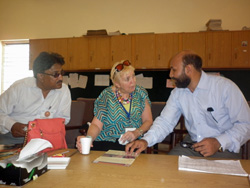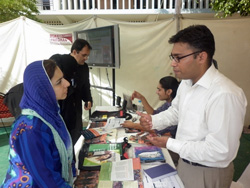by Zafar Yasin and Muhammad Nadim Farooqui
 Pakistan is one of the 12 countries of the world that spends less than 2% of its GNP on education; its primary education system ranks among the world’s least effective. The literacy rate in Sindh and Balochistan provinces are 59% and 41%, respectively. Only 40% of the literate population can read simple text in local languages.
Pakistan is one of the 12 countries of the world that spends less than 2% of its GNP on education; its primary education system ranks among the world’s least effective. The literacy rate in Sindh and Balochistan provinces are 59% and 41%, respectively. Only 40% of the literate population can read simple text in local languages.
A significant part of societies in the two provinces lack the reading habit. Generally students read selected portions of class textbooks to prepare for their eventual examinations. Education managers, school head teachers, and classroom teachers rarely buy any books for their own reading. Most schools lack library facilities.
 Schools that do have libraries have usually not updated their book collections for decades. As a result, the state of reading habits is alarming in the two provinces. The Sindh-Balochistan Reading Council (SBRC) believes that the current reading deficiency in society is one of the major causes of the existing wave of terrorism and extremism.
Schools that do have libraries have usually not updated their book collections for decades. As a result, the state of reading habits is alarming in the two provinces. The Sindh-Balochistan Reading Council (SBRC) believes that the current reading deficiency in society is one of the major causes of the existing wave of terrorism and extremism.
In order to make a significant difference in the education practices of these two provinces, SBRC hopes to build partner ships with schools for promoting a reading culture.
Planned interventions include:
- Conducting school academic audits for the purpose of identifying and enhancing reading spaces within and beyond school hours by promoting family reading engagements;
- Helping schools in building innovative classroom libraries, managed by students and teachers collaboratively. This innovative library model suggests a change of the whole collection of classroom books in every quarter. This feature of the library would not only attract students but also give them opportunity to interact with a large number of brand new books every year;
- Providing training to partner school teachers for maximum utilization of the classroom library;
- Opening opportunities for information exchange in order to improve mutual understanding and to develop competencies and skills necessary to enable changes in social attitude and behavior;
- Conducting action research to improve classroom teaching, enhance effectiveness of academic coordination, and refine management practices. (SBRC will work with classroom teachers, academic coordinators, and education managers to identify critical issues.)
 SBRC is a brand new council chartered with IRA and is already actively working in the Sindh and Balochistan Provinces of Pakistan. This new and enthusiastic council got the awesome opportunity to introduce itself and showcase IRA’s global contribution in an international conference organized by the Society of Pakistan English Language Teachers (SPELT - Pakistan’s largest and the oldest ELT body). The conference keynote speaker, presenters, and the audience received the two bodies very well. The visitors showed their interest to be part of the global and the local body. A few national organizations shared this degree of interest in collaboration. This wonderful experience boosted confidence and enthusiasm in our efforts for making a difference in our society against terrorism and extremism.
SBRC is a brand new council chartered with IRA and is already actively working in the Sindh and Balochistan Provinces of Pakistan. This new and enthusiastic council got the awesome opportunity to introduce itself and showcase IRA’s global contribution in an international conference organized by the Society of Pakistan English Language Teachers (SPELT - Pakistan’s largest and the oldest ELT body). The conference keynote speaker, presenters, and the audience received the two bodies very well. The visitors showed their interest to be part of the global and the local body. A few national organizations shared this degree of interest in collaboration. This wonderful experience boosted confidence and enthusiasm in our efforts for making a difference in our society against terrorism and extremism.
Zafar Yasin is the Senior Subject Specialist at Provincial Institute forTeacher Education, Quetta, Pakistan.
Muhammad Nadim Farooqui is the Professional Development Teacher at Aga Khan University-Institute for Educational Development.
The Sindh-Balochistan Reading Council was just awarded an IRA International Membership Development Award for reaching over 100 members in less than a year.
This article was originally printed in the December 2012/January 2013 issue
of Reading Today. IRA members can read the interactive digital version of the magazine here. Nonmembers: join today!
<a href="http://engage./directory/communitydetails/?CommunityKey=1e1d0278-6be6-4fac
-a1be-a119ce8ca58b">

